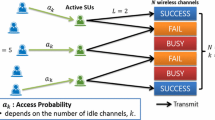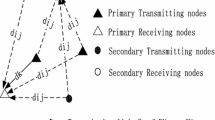Abstract
This article investigates a multiuser cognitive environment where secondary users compete to communicate over a channel licensed to a primary user using spectrum sharing. In this environment, both the primary and secondary users transmit to the same receiver unit, and the transmission power of the scheduled secondary user should satisfy the outage probability requirement of the primary user. Secondary users are ranked according to their channel strength, and performance measures are derived as a function of a generic channel rank. Bit error rate, channel capacity, and generated interference are investigated as performance measures. In addition, the performance of the proportional fair, random selection, and round-robin scheduling algorithms are investigated. Numerical results are presented to verify the theoretical analysis and investigate the effects the parameters of the communication environment have on the performance measures and the transmission power of the cognitive users.
Similar content being viewed by others
References
Federal Communications Commission. Spectrum policy task force report. ET Docket No. 02-135, November 2002.
Mitola, J. (2000). Cognitive radio: An integrated agent architecture for software defined radio. PhD thesis, Royal Institute of Technology (KTH), Stockholm, Sweden.
Le, H. S. T., & Liang, Q. (2007). An efficient power control scheme for cognitive radios. In IEEE wireless communications and networking conference (WCNC), pp. 2559–2563.
Hamdi, K., Zhang, W., & Letaief, K. B. (2007). Power control in cognitive radio systems based on spectrum sensing side information. In IEEE international conference on communications (ICC), pp. 5161–5165.
Kang, X., Zhang, R., Liang, Y.-C., & Garg, H. K. (2009). Optimal power allocation for cognitive radio under primary user’s outage loss constraint. In IEEE international conference on communications (ICC), pp. 1–5.
Zhang, R., Cui, S., & Liang, Y.-C. (2008). On ergodic sum capacity of fading cognitive multiple-access channel. In Forty-sixth annual Allerton conference, pp. 879–886.
Ban T. W., Choi W., Jung B. C., Sung D. K. (2009) Multi-user diversity in a spectrum sharing system. IEEE Transactions on Wireless Communications 8: 102–106
Li D. (2011) Efficient power allocation for multiuser cognitive radio networks. Wireless Personal Communications 59: 589–597
Ekin, S., Yilmaz, F., Celebi, H., Qaraqe, K., Alouini, M.-S., & Serpedin, E. (2009). Achievable capacity of a spectrum sharing system over hyper fading channels. In IEEE global communications conference (GLOBECOM), pp. 1–6.
Li D. (2010) Performance analysis of uplink cognitive cellular networks with opportunistic scheduling. IEEE Communications Letters 14: 827–829
Farraj, A. K., Miller, S. L., & Qaraqe, K. A. (2011). Queue performance measures for cognitive radios in spectrum sharing systems. In IEEE international workshop on recent advances in cognitive communications and networking (RACCN)—Global telecommunications conference (GLOBECOM) workshop, pp. 997–1001.
Farraj, A. K., & Hammad, E. M. (2012). Performance of primary users in spectrum sharing cognitive radio environment. Wireless Personal Communications. doi:10.1007/s11277-011-0469-2.
Farraj, A. K., & Hammad, E. M. (2012). Impact of quality of service constraints on the performance of spectrum sharing cognitive users. Wireless Personal Communications, doi:10.1007/s11277-012-0606-6.
Goldsmith A. (2005) Wireless communication. Cambridge University Press, Cambridge
Miller S. L., Childers D. G. (2004) Probability and random processes: With applications to signal processing and communications. Elsevier Academic Press, Amsterdam
Papoulis A., Pillai S. U. (2002) Probability, random variables, and stochastic processes . McGraw-Hill, New York
Sklar B. (1988) Digital communications: Fundamentals and applications. Prentice Hall, New Jersey
Cover T. M., Thomas J. A. (1991) Elements of information theory. Wiley, New Jersey
Tse D., Viswanath P. (2005) Fundamentals of wireless communication. Cambridge University Press, Cambridge
Author information
Authors and Affiliations
Corresponding author
Rights and permissions
About this article
Cite this article
Farraj, A.K., Miller, S.L. Scheduling in a Spectrum-Sharing Cognitive Environment Under Outage Probability Constraint. Wireless Pers Commun 70, 785–805 (2013). https://doi.org/10.1007/s11277-012-0722-3
Published:
Issue Date:
DOI: https://doi.org/10.1007/s11277-012-0722-3




